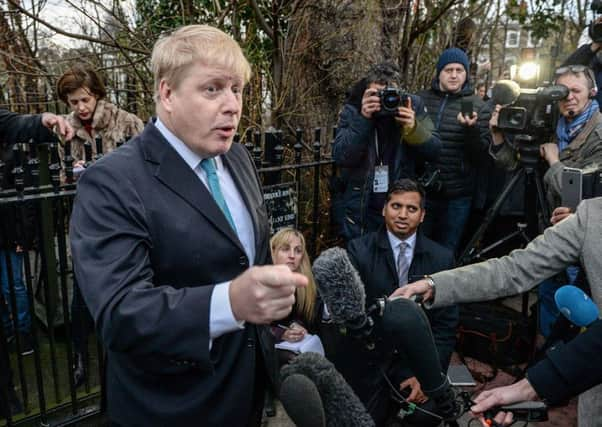Ian Swanson: BoJo's Brexit strategy is key to referendum result


At one stage it seemed pretty certain that the vote would be to stay in. With the leadership of all the mainstream parties backing continued membership – along with a majority of business leaders – it was difficult to see any other result.
But now opinion polls suggest there is a serious chance that voters could go the other way and the UK will leave the EU. One survey found 45 per cent wanting out of the EU and just 36 per cent planning to vote Remain.
Advertisement
Hide AdAdvertisement
Hide AdIf there happened to be some economic scare or a crisis over more migrants arriving in Europe around the day of the vote, it is easy to imagine public opinion being galvanised by some of the Leave campaigners into voting for Brexit.
DOWNLOAD THE EDINBURGH EVENING NEWS APP ON ITUNES OR GOOGLE PLAY
So it’s worth remembering why the referendum is being held at all. It’s not because of any major change in EU policy or constitution or because of a popular clamour. Mr Cameron promised a referendum because of the divisions in his own party and the threat posed to the Tories by the rampantly anti-EU Ukip.
And even now, as the referendum gets under way, the whole event can be seen as an internal power struggle for the future leadership of the party. London Mayor Boris Johnson’s decision to urge a Leave vote pitches him directly against not only the Prime Minister but also his main rival for the succession, Chancellor George Osborne.
Advertisement
Hide AdAdvertisement
Hide AdIf the Leave side wins, Mr Cameron will have to quit – despite his protestations otherwise – and Mr Johnson will be in poll position to take over. If it’s a victory for Remain, Mr Johnson’s chances of becoming the next leader will surely be reduced – though one theory has him still winning because so many of the Tory grassroots are for Out.
The divisions go right to the top – six cabinet ministers have decided to campaign against Mr Cameron and for leaving the EU.
And well over 100 Tory MPs have signed up for Brexit, with commentators saying half the parliamentary party will end up on the Leave side.
Europe has long been a bone of contention in the Conservative Party. Ted Heath, the prime minister who took Britain into what was then known as the Common Market back in 1973, was a Euro-enthusiast. But his successor Margaret Thatcher built a large part of her reputation on her defence of Britain against supposed EU encroachment. John Major complained about “bastards” inside his own cabinet undermining him over Europe and went as far as staging a “back me or sack me” leadership election in a bid to silence the Eurosceptics.
Advertisement
Hide AdAdvertisement
Hide AdBut up to this point the Tories have kept their squabble in-house. Now they have dragged the whole nation into the row – with potentially drastic consequences.
If the polls are right, Scotland will vote to stay in the EU – and if the overall result is Brexit, Nicola Sturgeon has warned it is likely to lead to a fresh independence referendum north of the Border. But even if the UK as a whole decides to stay in, will the anti-EU Tories give up? Euroscepticism is deeply rooted in many of the faithful and will be difficult to see off. The Europe debate has the feel of a row that will run and run.
Ms Sturgeon may want to add Boris Johnson getting the keys to Number Ten as another trigger point for Indyref II.